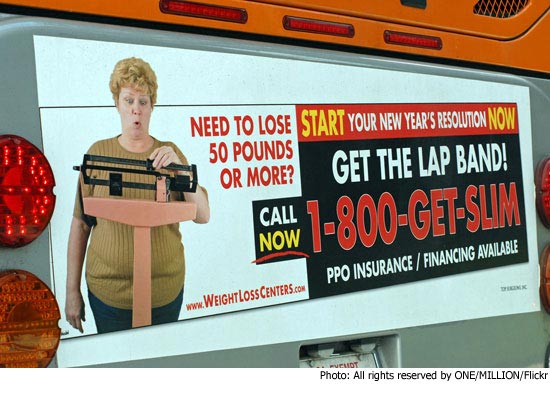Top county doc wants lap band ad probe
December 8, 2010
L.A. County’s top public health official wants to put the squeeze on those ubiquitous LAP-BAND ads.
In a Dec. 7 letter to the U.S. Food and Drug Administration, Dr. Jonathan E. Fielding asks the agency to investigate whether widespread promotion of the LAP-BAND by the 1-800-GET-THIN weight loss clinics is misleading the public by failing to disclose enough about the potential risks of such surgery.
Fielding, the county’s director of public health, said while bariatric surgery can be appropriate for some severely obese patients, it’s not for “the vast majority of individuals, and should be reserved for those who have failed other approaches.”
He also took aim at the assertion in the advertising campaign that “Diets fail!” which he said undercuts the importance of healthy, common-sense lifestyle choices.
“Misleading advertisements erode the ability of the majority of the public, who are currently either overweight or obese, to fairly consider alternative weight management options, and for ‘normal’ weight individuals to be concerned about behavior that increases risk of weight gain,” Fielding said in the letter.
Fielding’s letter comes as Allergan, which manufactures the LAP-BAND system, is seeking approval to broaden the use of its product by allowing less obese people to use it. Lowering the standards to include people with a body mass index of 35, or 30 if they have other conditions, could mean more than 2 million people in L.A. County would be eligible for such surgery, Fielding said. Currently, most patients must have a body mass index of at least 40, or 35 with certain other conditions, or be more than 100 pounds overweight, to be considered eligible for LAP-BAND surgery.
An FDA advisory panel last week voted in favor of the proposed expansion to less obese patients.
Anyone who’s driven or watched television in Los Angeles County has likely seen the billboards and bus ads touting LAP-BAND and heard the 1-800-GET-THIN jingle. A sampling of the ads were included with Fielding’s letter to the FDA.
Misleading promotional messages, especially if the device becomes available to more people, may prove to be a disincentive to maintaining a healthy lifestyle because they create the “false impression that there is a very simple, fast, effective and permanent fix” for weight loss, Fielding said
In an interview, Fielding said one purpose of his letter is to have the FDA clarify who bears responsibility for fully disclosing any potential risks associated with a medical device.
A spokeswoman for Allergan said her company had no role in the billboard and current TV advertising campaigns. “Allergan doesn’t control, manage or have any input on those ads,” said spokeswoman Cathy Taylor, who said her company would not comment on others’ promotional efforts involving the device.
Representatives for 1-800-GET-THIN could not be reached.
Fielding’s letter was directed to Dr. Herbert Lerner, acting director of the FDA’s Reproductive, Gastro-Renal and Urological Devices Center for Devices and Radiological Heath.
Fielding urges Lerner to take steps to ensure that the LAP-BAND promotional campaign “does not constitute misbranding of a restricted device.”
Fielding is not alone in voicing concerns about the potential expansion of the device’s use. Others, including the National Women’s Health Network, a nonprofit advocacy group, and the National Research Center for Women and Families also have raised questions. Before voting in favor of the proposed expanded use for the LAP-BAND, the FDA advisory panel heard testimony from New York attorney Stephanie Quatinetz, whose 27-year-old daughter died after LAP-BAND surgery.
Posted 12/8/10













 405 bridge work causes a stink
405 bridge work causes a stink
